Aldeburgh Festival, Weekend 2 review - nine premieres, three young ensembles - and Allan Clayton | reviews, news & interviews
Aldeburgh Festival, Weekend 2 review - nine premieres, three young ensembles - and Allan Clayton
Aldeburgh Festival, Weekend 2 review - nine premieres, three young ensembles - and Allan Clayton
A solstice sunrise swim crowned the best of times at this phoenix of a festival
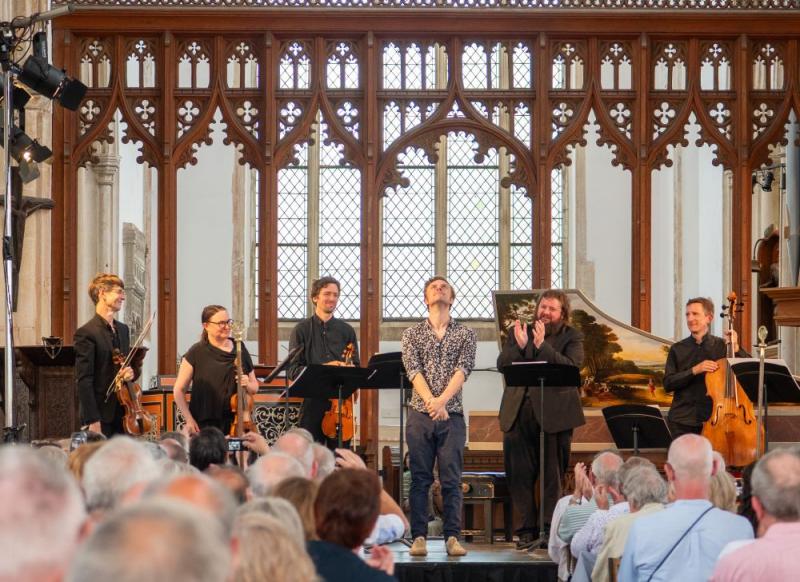
Actually it was a Thursday evening to Saturday experience, but what riches in seven concerts. The only Britten I heard was one of the Six Metamorphoses after Ovid as I approached the Red House on a hot Saturday morning, just too late for that pop-up performance, but in time for Berio. The old guard of composers made a mixed impression, but one of several highlights was to discover how imaginative the new generation is proving in six world premieres.
The two biggest contemporary triumphs rested partly in the infinitely adaptable voice of tenor Allan Clayton, one of the four “Festival Featured Musicians” this year. Very sorry to have left before his Sunday afternoon performance of Britten’s Our Hunting Fathers with the BBC Symphony Orchestra and Sakari Oramo, but by the same token wouldn’t want to have missed his nuanced teamwork with Edward Gardner and the Royal Academy of Music Symphony Orchestra in Turnage’s Refugee song-cycle. It dates from 2016, spurred by the distressing image of three-year-old Syrian Alan Kurdi, his body washed up on a Turkish beach, but it is just as pertinent now, and will remain so. 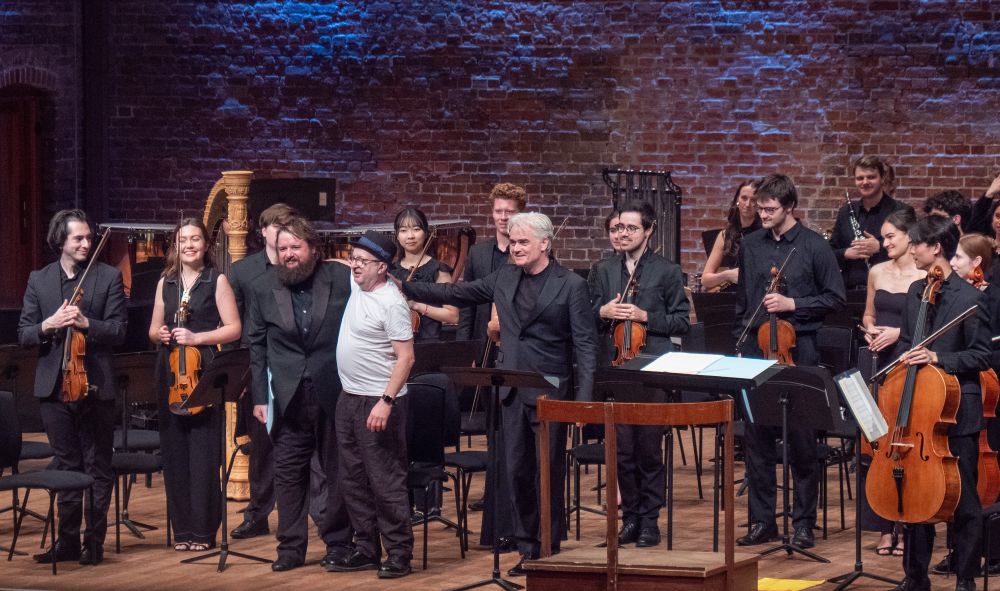 Turnage and Clayton (pictured above with Gardner and members of the RAM Symphony Orchestra) are still coasting on the unqualified triumph of Festen at the Royal Opera, with a strong libretto by Lee Hall. The composer's choice of poets here is remarkable: Emily Dickinson's "These Strangers", in a short but immediately engaging first setting, Benjamin Zaphaniah's "We Refugees", Auden's already song-like "Refugee Blues" (hints of Weill and the 1940s, but without Turnage's beloved saxophones) and Brian Bilston's "Refugees", which takes on the opposite meaning from its cruelly intentioned essence when read from bottom to top. While I'm not sure what the Interlude between the Auden and this signifies, the emotion is perfectly contained in the music, with eloquent solos from the RAM woodwind.
Turnage and Clayton (pictured above with Gardner and members of the RAM Symphony Orchestra) are still coasting on the unqualified triumph of Festen at the Royal Opera, with a strong libretto by Lee Hall. The composer's choice of poets here is remarkable: Emily Dickinson's "These Strangers", in a short but immediately engaging first setting, Benjamin Zaphaniah's "We Refugees", Auden's already song-like "Refugee Blues" (hints of Weill and the 1940s, but without Turnage's beloved saxophones) and Brian Bilston's "Refugees", which takes on the opposite meaning from its cruelly intentioned essence when read from bottom to top. While I'm not sure what the Interlude between the Auden and this signifies, the emotion is perfectly contained in the music, with eloquent solos from the RAM woodwind.
The whole made a hard-hitting programme which didn't allow attention to lapse for a second; a huge Marsh Harrier, spotted over the reeds and the water at the back of the Maltings on successive evenings, seemed to complement the spirit of the concert. Featured composer Daniel Kidane's rhythmically complex and bracing Sirens, synthesizing aspects of Mancunian club culture, made much more of an impact than the later Awake, another kick-start piece at the Maltings two evenings later, which felt derivative and unfelt in its relentless tonality. 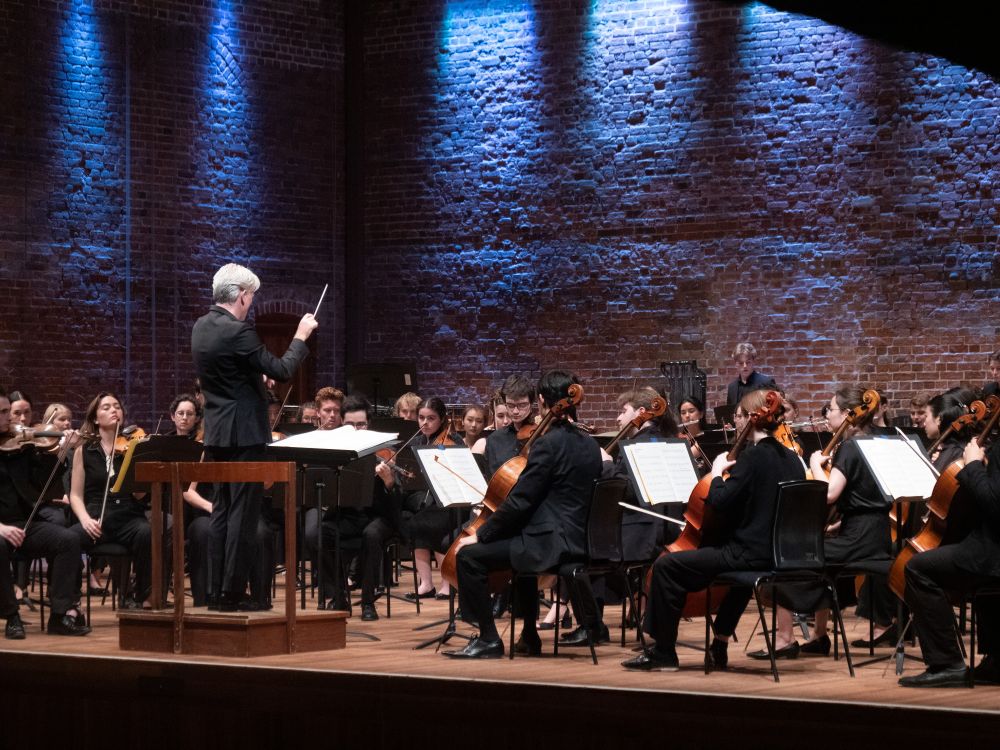 Nielsen's Fourth, "Inextinguishable" Symphony in the concert's second half still feels so contemporary in its energy, despite periods of settled folksiness, above all in the ingeniously-scored second movement dominated by woodwind before the shock of exposed strings in a gut-wrenching Poco adagio. The time has long passed when one needed to make allowances for youth orchestras: Gardner knew he could draw the greatest power and muscly articulation especially from the RAM violins. Nielsen makes cruel demands, but these young players met them all.
Nielsen's Fourth, "Inextinguishable" Symphony in the concert's second half still feels so contemporary in its energy, despite periods of settled folksiness, above all in the ingeniously-scored second movement dominated by woodwind before the shock of exposed strings in a gut-wrenching Poco adagio. The time has long passed when one needed to make allowances for youth orchestras: Gardner knew he could draw the greatest power and muscly articulation especially from the RAM violins. Nielsen makes cruel demands, but these young players met them all.
Youth continued to rule the roost in the Friday daytime concerts. It was surprising to find the enticingly madeover Jubilee Hall in Aldeburgh more or less full for a fairly hardcore programme by the Ensemble Renard (pictured below): together as wind quintet for Berio's Ricorrenza, the world premiere of Cheryl Frances-Hoad's quirky Blue Cheese and Olive Oil and Esa-Pekka Salonen's richly-layered Memoria, a homage to Berio in the year of his death (2003). 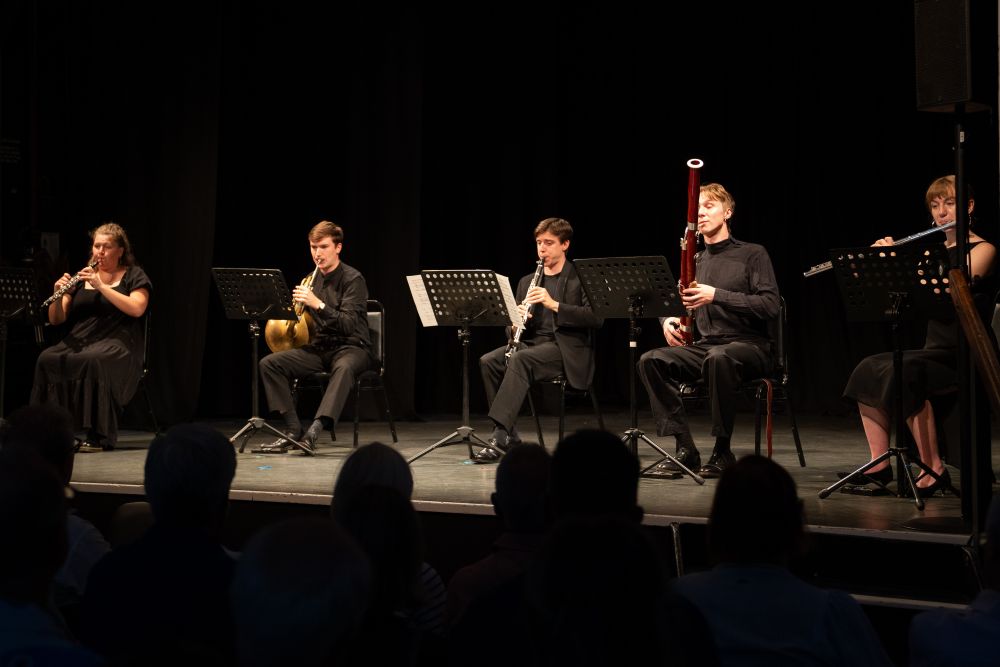 It's telling how Frances-Hoad recalls that during her preparation for the new work to celebrate the centenaries of Boulez and Berio, which included studying, reading and of course listening, "no source of inspiration revealed itself" - so she settled on Boulez's home town of Montbrison, producer of a famous blue cheese, and Berio's native Oneglia, where another Berio (Filippo) made a brand of olive oil famous. For me, the entire fascination of Boulez's way-too-long dialogues of clarinet with recorded selves, Dialogues de l'ombre double, rested in the virtuosity of James Gilbert.
It's telling how Frances-Hoad recalls that during her preparation for the new work to celebrate the centenaries of Boulez and Berio, which included studying, reading and of course listening, "no source of inspiration revealed itself" - so she settled on Boulez's home town of Montbrison, producer of a famous blue cheese, and Berio's native Oneglia, where another Berio (Filippo) made a brand of olive oil famous. For me, the entire fascination of Boulez's way-too-long dialogues of clarinet with recorded selves, Dialogues de l'ombre double, rested in the virtuosity of James Gilbert.
Ditto Berio's Sequenza I for the sake of Ella Blamirez and, on Saturday morning around the Red House and its grounds, Sequenza VII for Francesca Cox and Sequenza XII as a feat of incredible stamina and variety from Patrick Bolton in the calm and cool of the glorious library (pictured below, audience standing or seated for Gilbert's performance of Sequenza IX). Regretfully I missed the turn of French horn player George Strivens, but his warmth of tone was clear enough in the Jubilee Hall ensemble pieces. 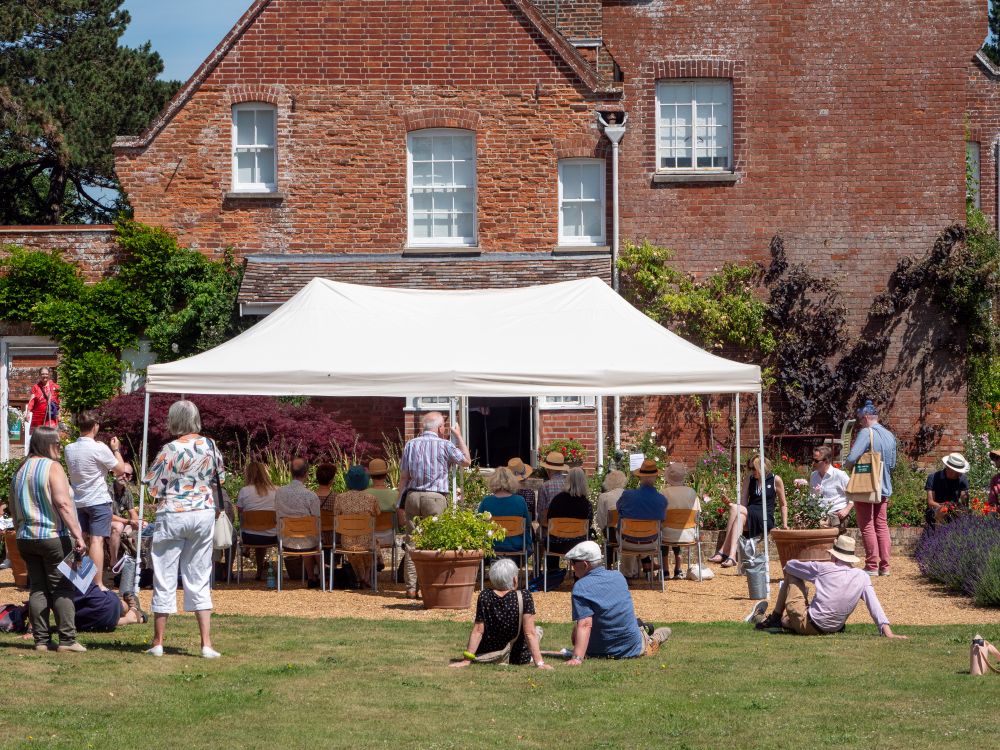 Young composers and players together absolutely dazzled in the big "New Music Now" concert over at the Britten Studio on Friday afternoon. It can be a hard time to focus, but in the first place the time limit of five minutes for each of the composer-participants on the Aldeburgh Composition and Performance Course, founded in 1992 by Colin Matthews and Oliver Knussen, kept it all tight, and secondly, they all seemed to have something engaging to say, assisted by interesting choices of texts for one or two singers alongside the brilliant players of the Britten Pears Contemporary Ensemble under the razor-sharp direction of Jonathan Berman,
Young composers and players together absolutely dazzled in the big "New Music Now" concert over at the Britten Studio on Friday afternoon. It can be a hard time to focus, but in the first place the time limit of five minutes for each of the composer-participants on the Aldeburgh Composition and Performance Course, founded in 1992 by Colin Matthews and Oliver Knussen, kept it all tight, and secondly, they all seemed to have something engaging to say, assisted by interesting choices of texts for one or two singers alongside the brilliant players of the Britten Pears Contemporary Ensemble under the razor-sharp direction of Jonathan Berman,
Colin Matthews introduced the programme and begged forgiveness if he, Helen Grime and Turnage, who later said how much he liked all the participants ("not always the case"), had taken the liberty of inserting their own pieces as well as memorials to Kaija Saariaho and Alexander Goehr. It was good to hear them all so compellingly played; again, the deepest impression probably came from the shortest piece, Saariaho's exquisite setting of a speech by Miranda from Shakespeare's The Tempest.
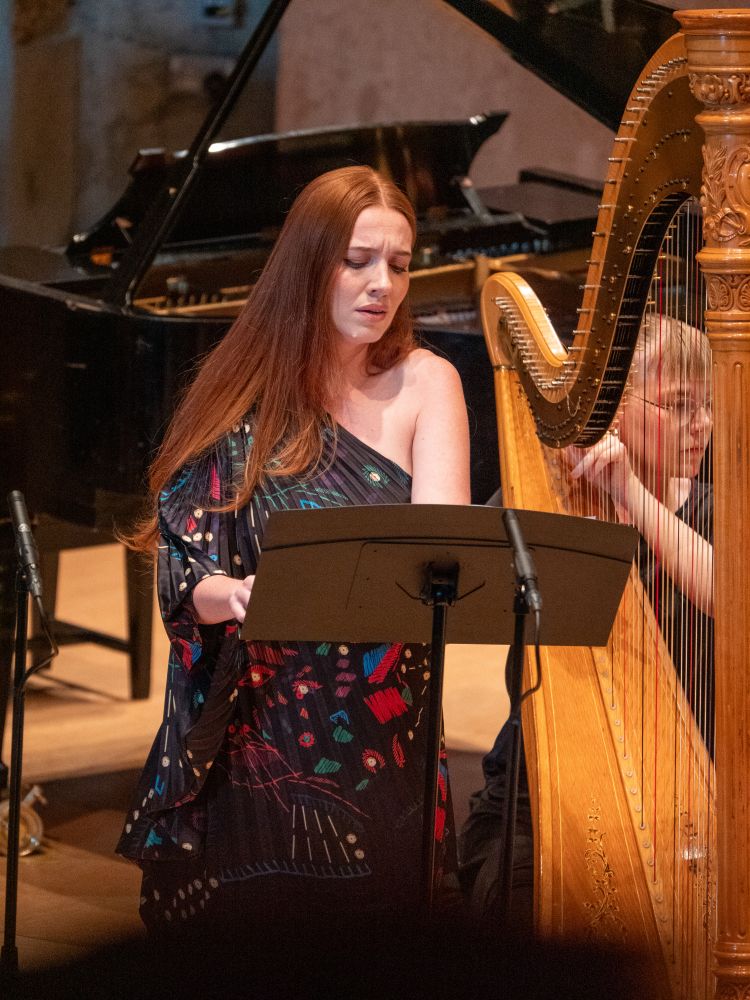 Grimes had chosen a less felicitous text, by Carol Ann Duffy, for "Prayer" from Eight Songs for Isolation, originally performed online by Sarah Connolly, here heard live for the firat time sung by a very promising mezzo who looks set to follow in her footsteps, Joanne Evans (pictured left).
Grimes had chosen a less felicitous text, by Carol Ann Duffy, for "Prayer" from Eight Songs for Isolation, originally performed online by Sarah Connolly, here heard live for the firat time sung by a very promising mezzo who looks set to follow in her footsteps, Joanne Evans (pictured left).
She was joined by soprano Jennifer Kreider in some of the new pieces. Alex Tay, a delightful maverick with a unique personality (I spoke to him in the interval), blindsided us with the title of his work, britmod, since here were more extraordinary lines by Emily Dickinson set in a blindingly brilliant soundscapre (in this case you can take "dazzling" in the general praise literally). Reading the note afterwards, I felt like I was further in a hall of mirrors. Mingdu Li's Time, Temp played with the metaphysical in a more monosyllabic way. Liucilė Vilimaitė's Kosminė Cenzūra ("Cosmic Censorship"), a shamanic ritual as befits her native Lithuania, had the most visceral effect. 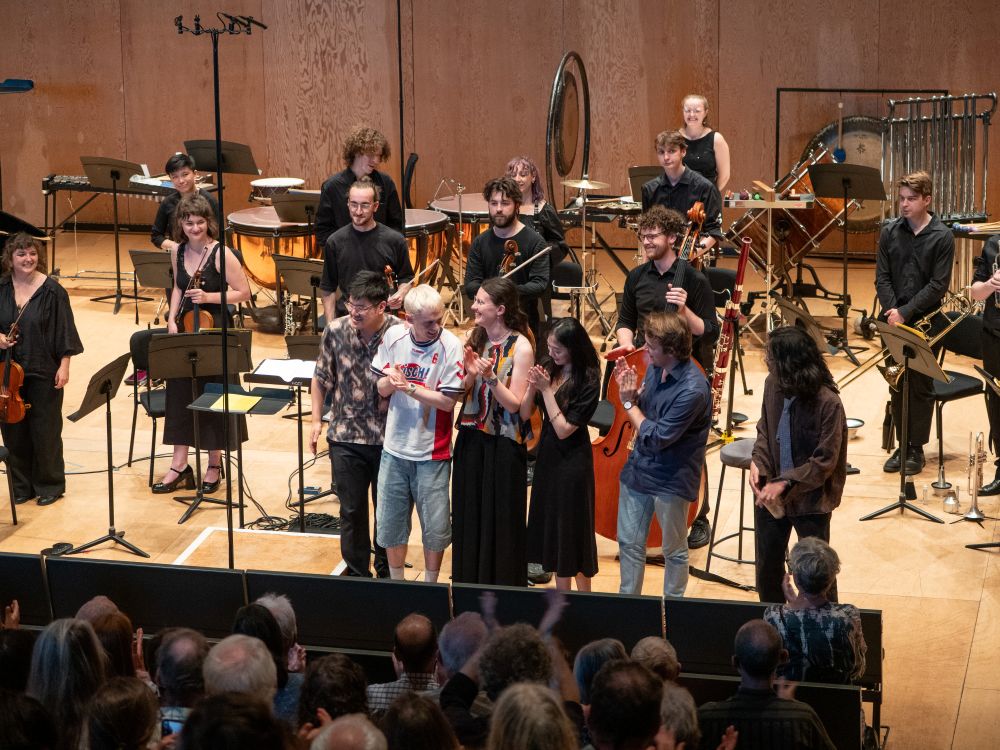 If the second-half pieces by Hy-Kang Dang and Sam Rudd-Jones have stayed with me less, the imaginative levels remained high, and it was appropriate to end with Jasper Eaglesfield's No Garden, No Flowers, a short jeu d'esprit with a brief excursion into the whirl of Tchakovsky's celebrated Nutcracker number. I want to follow the progress of all these composers (pictured above: Dang, Rudd-Jones, Vilimaitė, Li, Eaglesfield and Tay with the players of the Britten-Pears Contemporary Ensemble).
If the second-half pieces by Hy-Kang Dang and Sam Rudd-Jones have stayed with me less, the imaginative levels remained high, and it was appropriate to end with Jasper Eaglesfield's No Garden, No Flowers, a short jeu d'esprit with a brief excursion into the whirl of Tchakovsky's celebrated Nutcracker number. I want to follow the progress of all these composers (pictured above: Dang, Rudd-Jones, Vilimaitė, Li, Eaglesfield and Tay with the players of the Britten-Pears Contemporary Ensemble).
Exuberant experience was the keynote of the evening event, in which Paul McCreesh activated his perfect performing edition with Christopher Suckling of Purcell's King Arthur: the perfect way to redeem last year's well-executed but sometimes soporific festival trawl through way too much of The Fairy Queen. Here there were no visual frills and furbelows; the nine soloists acted out the more dramatic scenes well enough (though a little stage direction wouldn't have gone amiss), and provided consistent vocal wonders in solos, duets, trios and choruses alongside McCreesh's racy Gabrieli Consort. 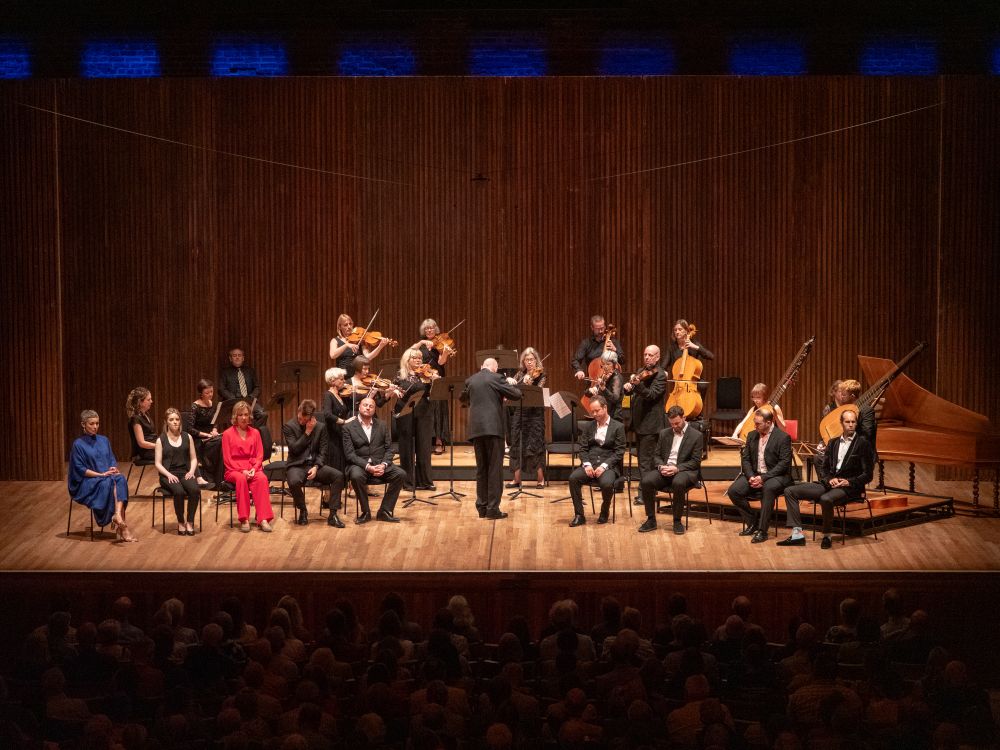 The scenario, though punctuated by masques and oblique references to royalty in a surprisingly doggerel text by Dryden, is more operatic-dramatic than that of The Fairy Queen. When the highlights came, they were all exquisitely taken: the Shepherd's Idyll by Matthew Long, the well-contrasted confrontation of Cupid and Cold Genius by Rowan Pierce and Ashley Riches, producing one phrase of astonishing length, Anna Dennis and Mhairi Lawson as sirens hymning their father the "aged stream", Dennis working with Marcus Farnsworth to get the right changes of pace in the "Song for Mr Howe" before winning the beauty pageant with "Fairest Isle". Pure joy from start to finish, with dashes of strangeness and pathos.
The scenario, though punctuated by masques and oblique references to royalty in a surprisingly doggerel text by Dryden, is more operatic-dramatic than that of The Fairy Queen. When the highlights came, they were all exquisitely taken: the Shepherd's Idyll by Matthew Long, the well-contrasted confrontation of Cupid and Cold Genius by Rowan Pierce and Ashley Riches, producing one phrase of astonishing length, Anna Dennis and Mhairi Lawson as sirens hymning their father the "aged stream", Dennis working with Marcus Farnsworth to get the right changes of pace in the "Song for Mr Howe" before winning the beauty pageant with "Fairest Isle". Pure joy from start to finish, with dashes of strangeness and pathos.
Baroque met contemporary in the most well-planned concert sequence of the weekend, at a sunlight-flooded Blythburgh Church overlooked by the angels of the ceiling of this great building, who should have been delighted with everything they heard, the dark as well as the bright.  A perfect symmetry bookended nostalgia, lamentation and fright with small-scale, big-hearted Bach from players of the Dunedin Consort (pictured above). Leader Matthew Truscott, who spoke with absolute naturalness about the programme, duetted in highest style with flautist Rosie Bowker in the Fifth Brandenburg Concerto, while harpsichordist Stevie Farr flew in that long surprise cadenza, The Second Orchestral Suite spotlit Bowker, who coped perfectly with the high speed of the celebrated Badinerie at the end.
A perfect symmetry bookended nostalgia, lamentation and fright with small-scale, big-hearted Bach from players of the Dunedin Consort (pictured above). Leader Matthew Truscott, who spoke with absolute naturalness about the programme, duetted in highest style with flautist Rosie Bowker in the Fifth Brandenburg Concerto, while harpsichordist Stevie Farr flew in that long surprise cadenza, The Second Orchestral Suite spotlit Bowker, who coped perfectly with the high speed of the celebrated Badinerie at the end.
It was impressive to hear four of the period strings adapt so easily to the intrigues of Caroline Shaw's Punctum. Then there was Allan Clayton to emphasise the sheer originality of Zelenka's Lamentation 1 from the 1722 Lamentationes pro die Jovis Sancto. The Britten Pears commission the other side of it both maintained the elegy and localised its central terror: the supernatural dog of Black Shuck Lament is supposed to have plagued either Bungay or Blythburgh Church. A total triumph: riveting writing, gripping performance, especially when Clayton took over the plucked string ticking of the start. 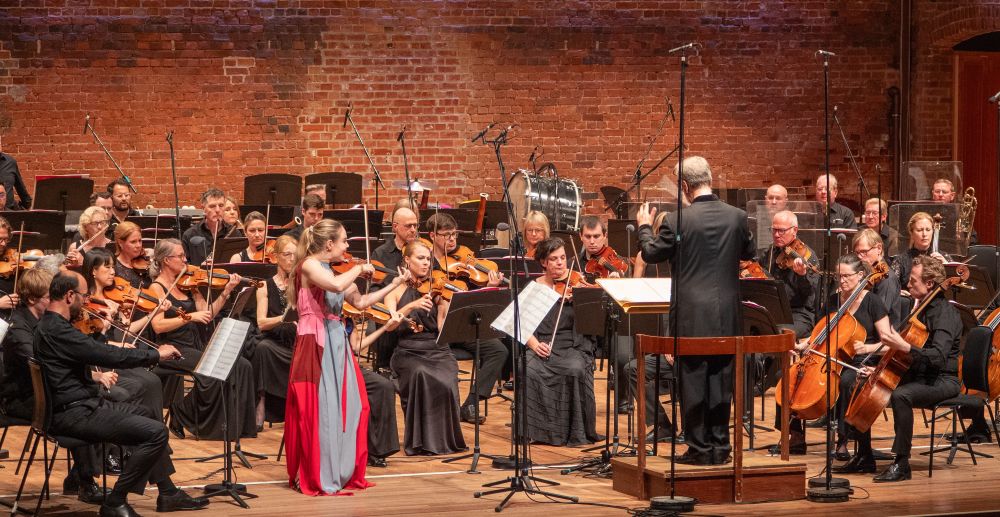 The stakes were high for the UK premiere of Helen Grime's Violin Concerto in the evening concert, the first of two with the BBC Symphony Orchestra conducted by Sakari Oramo. Leila Josefowicz's charismatic ferocity was apparent from the start, though the concerto didn't deliver originality until its last third, where a four-note carillon combines with a compelling build of intensity towards an exciting conclusion.
The stakes were high for the UK premiere of Helen Grime's Violin Concerto in the evening concert, the first of two with the BBC Symphony Orchestra conducted by Sakari Oramo. Leila Josefowicz's charismatic ferocity was apparent from the start, though the concerto didn't deliver originality until its last third, where a four-note carillon combines with a compelling build of intensity towards an exciting conclusion.
Oramo had planned an unusual second half: it's probably the first time I've heard Strauss's Four Last Songs placed at the end of the concert. That made sense, because right at the end as the singer wonders "Is this perhaps death?", the first horn introduces the "ideology" motif from the much earlier Tod und Verklärung (Death and Transfiguration). Oramo was in his flexible element for the symphonic poem's oscillations between hope and fear, doom and transcendence, with the finest woodwind solos part of the more selective side of Strauss's orchestration, striking after so much densely-scored contemporary music,
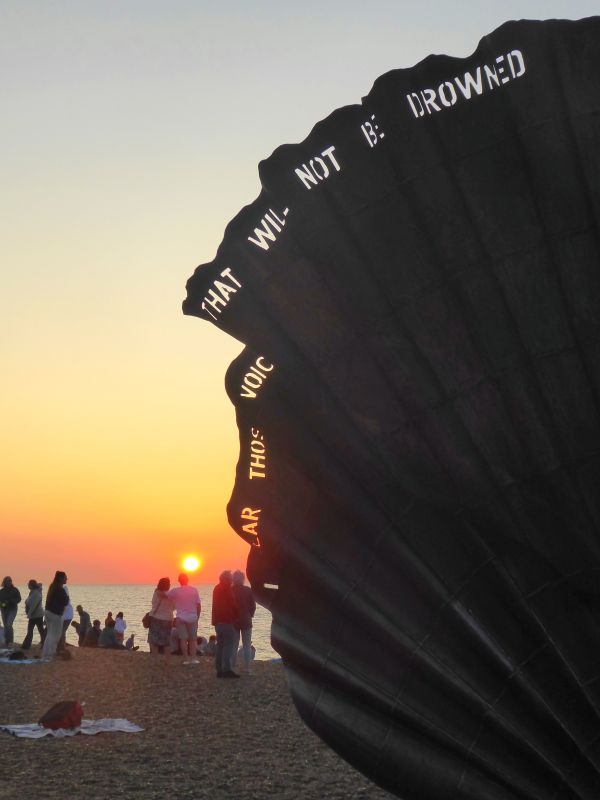
Explore topics
Share this article
The future of Arts Journalism
You can stop theartsdesk.com closing!
We urgently need financing to survive. Our fundraising drive has thus far raised £49,000 but we need to reach £100,000 or we will be forced to close. Please contribute here: https://gofund.me/c3f6033d
And if you can forward this information to anyone who might assist, we’d be grateful.

Subscribe to theartsdesk.com
Thank you for continuing to read our work on theartsdesk.com. For unlimited access to every article in its entirety, including our archive of more than 15,000 pieces, we're asking for £5 per month or £40 per year. We feel it's a very good deal, and hope you do too.
To take a subscription now simply click here.
And if you're looking for that extra gift for a friend or family member, why not treat them to a theartsdesk.com gift subscription?
more Classical music
 Kempf, Brno Philharmonic, Davies, Bridgewater Hall, Manchester review - European tradition meets American jazz
Bouncing Czechs enjoy their Gershwin and Brubeck alongside Janáček and Dvořák
Kempf, Brno Philharmonic, Davies, Bridgewater Hall, Manchester review - European tradition meets American jazz
Bouncing Czechs enjoy their Gershwin and Brubeck alongside Janáček and Dvořák
 Solomon, OAE, Butt, QEH review - daft Biblical whitewashing with great choruses
Even a top soprano and mezzo can’t make this Handel paean wholly convincing
Solomon, OAE, Butt, QEH review - daft Biblical whitewashing with great choruses
Even a top soprano and mezzo can’t make this Handel paean wholly convincing
 Two-Piano Gala, Kings Place review - shining constellations
London Piano Festival curators and illustrious friends entertain and enlighten
Two-Piano Gala, Kings Place review - shining constellations
London Piano Festival curators and illustrious friends entertain and enlighten
 Echo Vocal Ensemble, Latto, Union Chapel review - eclectic choral programme garlanded with dance
Beautiful singing at the heart of an imaginative and stylistically varied concert
Echo Vocal Ensemble, Latto, Union Chapel review - eclectic choral programme garlanded with dance
Beautiful singing at the heart of an imaginative and stylistically varied concert
 Scott, Irish Baroque Orchestra, Whelan, RIAM, Dublin review - towards a Mozart masterpiece
Characteristic joy and enlightenment from this team, but a valveless horn brings problems
Scott, Irish Baroque Orchestra, Whelan, RIAM, Dublin review - towards a Mozart masterpiece
Characteristic joy and enlightenment from this team, but a valveless horn brings problems
 Classical CDs: Voice flutes, flugelhorns and froth
Baroque sonatas, English orchestral music and an emotionally-charged vocal recital
Classical CDs: Voice flutes, flugelhorns and froth
Baroque sonatas, English orchestral music and an emotionally-charged vocal recital
 Kanneh-Mason, Britten Sinfonia, Shave, Milton Court - a grin and a big beaming smile
A pair of striking contemporary pieces alongside two old favourites
Kanneh-Mason, Britten Sinfonia, Shave, Milton Court - a grin and a big beaming smile
A pair of striking contemporary pieces alongside two old favourites
 theartsdesk at the New Ross Piano Festival - Finghin Collins’ musical rainbow
From revelatory Bach played with astounding maturity by a 22 year old to four-hand jazz
theartsdesk at the New Ross Piano Festival - Finghin Collins’ musical rainbow
From revelatory Bach played with astounding maturity by a 22 year old to four-hand jazz
 First Person: Manchester Camerata's Head of Artistic Planning Clara Marshall Cawley on questioning the status quo
Five days of free events with all sorts of audiences around Manchester starts tomorrow
First Person: Manchester Camerata's Head of Artistic Planning Clara Marshall Cawley on questioning the status quo
Five days of free events with all sorts of audiences around Manchester starts tomorrow
 Goldscheider, Brother Tree Sound, Kings Place review - music of hope from a young composer
Unusual combination of horn, strings and electronics makes for some intriguing listening
Goldscheider, Brother Tree Sound, Kings Place review - music of hope from a young composer
Unusual combination of horn, strings and electronics makes for some intriguing listening

Add comment